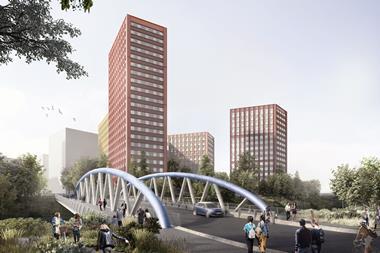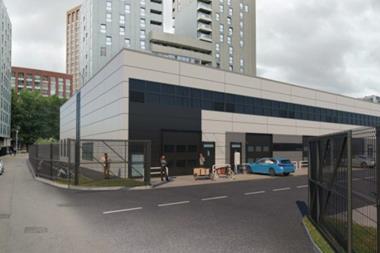In the first of a series of PropCast episodes dedicated to the life sciences, Kaleigh Haeg from Source Bioscience and Science Kode, and Syncona’s Alex Hamilton discuss the challenges and opportunities facing the UK’s burgeoning life sciences sector in an episode recorded at the end of 2021.
You can listen to this podcast via Apple Podcasts or Spotify or SoundCloud or listen to it through the player below:
Alex Hamilton is a partner at Syncona Investment Management, a FTSE 250 venture capital firm that invests in early-stage life sciences firms, and Kaleigh Haeg is head of strategy at Source Bioscience, a lab services provider, as well as the founder of Science Kode, a company that curates life sciences hubs.
Both guests featured alongside Harrison Street, the Universities of Oxford and Cambridge, and Blackstone’s life sciences property arm BioMed Realty in a groundbreaking report into the UK life sciences sector co-authored by Blackstock Consulting, Savills and Perkins&Will.
Hamilton sees clustering as key to achieving the government’s oft-repeated ‘levelling up’ agenda: “The UK does well today in terms of building companies out of various universities across the country. Where we struggle is in building enough mass in one particular place to establish a true biotech community. There are some in Oxford and Cambridge, but we don’t have a self-sustaining ecosystem in the way Boston or San Francisco does.”
Discussing the OxCam Arc, Hamilton points to the problem of connectivity. “If you fly into Heathrow, how long is it going to take you to get into the Arc? Probably more than an hour.”
One of Syncona’s portfolio companies is Autolus, whose lead asset is developing for an unmet need among thousands of adult patients for treatment for acute lymphoblastic leukemia (ALL), a form of cancer. Clusters will be crucial for these kinds of life-saving technologies, with Hamilton pointing out that Autolus requires “more than just labs. They’re running a clinical trial, they’re building out their commercial capabilities. They’re doing manufacturing.”
As head of strategy at Source Bioscience, Haeg implements strategic initiatives for a range of life sciences clients. Earlier this year, she founded Science Kode, which looks at solutions for creating life science clusters. Haeg argues that one of the key barriers faced by new life science companies is finding space in the right location, and not paying an arm and a leg for it.
She suggests that the market has over-relied on the traditional science park model, and questions whether the sector needs as many as are currently on the market – adding that the strategy does scientists a disservice. “We should split large parks into smaller, key locations, and make more of a hub for them,” she suggests.
And as Hamilton argues: “Building a science company is a lot more than hiring a bunch of scientists with some pipettes. There’s a whole infrastructural organisation around them that actually isn’t scientific at all. It involves HR, legal, and management functions. Science parks are too lab-focused.”
Both point to the potential of London’s King’s Cross, with Hamilton explaining: “You’re in a community that stretches across north London, including the Royal Free Hospital, University College Hospital, and the associated research institutes like the Francis Crick Institute. You’re on the train line out to Cambridge or Stevenage, and you’re not far from three international airports. So in terms of connectivity, it’s a really good site. It’s also a vibrant place that people enjoy being in.”
“Retail spaces can be converted into labs quite easily, more than actual office space - and there’s a ton of retail space in King’s Cross”, Haeg adds. “Dedicated space like this would give touch points for scientists to get more exposure and present one front door.”
The opportunity that areas like King’s Cross present is part of the reason Haeg founded Science Kode. She argues that the success of life sciences real estate is inextricably linked to its proximity to scientific capacity, requiring the curation of a combined academic, scientific, and investment zone.
Looking forward, Hamilton predicts that this year, investors will be looking for “more scale-up space of the 20- to 200-person sort. More landlords who have a better understanding of the market. And a much greater familiarity with the model and the knowledge that if this company goes under, a new one will just take its place on broadly very similar terms to the existing lease.”
You can listen to this podcast via Apple Podcasts or Spotify or SoundCloud or listen to it through the player above.
Previous Podcasts:
#117 Boris has reached the end of the road, Steven Norris tells PropCast
Apple | Spotify | SoundCloud
#116 Mental health services are a ‘differentiator’ for PBSA, says Nido COO
Apple | Spotify | SoundCloud
#115 Property podcast: Alecta says housing supply is crucial to retaining talent in cities
Apple | Spotify | SoundCloud
#114 Sale of stake in Fizzy Living was ‘always the plan’, says Metropolitan Thames Valley
Apple | Spotify | SoundCloud
#113 High street regeneration: Public space, data and flexible spaces are key, but mass resi conversions aren’t the answer
Apple | Spotify | SoundCloud
#112 Podcast: BossCast: GP surgeries are a healthy inflation hedge, says Assura boss Murphy
Apple | Spotify | SoundCloud
#111 Podcast: Property podcast: Technology can fix “antiquated” construction industry and enable Government to meet net zero targets
Apple | Spotify | SoundCloud
#110 Podcast: The Office Group’s boss hails London’s first timber office building in centuries as landlords respond to climate crisis
Apple | Spotify | SoundCloud
#109 Golden postcodes are losing their shine, says Daniel Daggers
Apple | Spotify | SoundCloud
#108 Property podcast: Carbon pricing is key, says GPE’s sustainability chief ahead of COP26
Apple | Spotify | SoundCloud
#107 The government must show leadership on building safety, says Network Homes
Apple | Spotify | SoundCloud
#106 PropCast: Co-locating homes and commercial space is prime for Londoners and Amazon deliveries
Apple | Spotify | SoundCloud
#105 Modern methods of construction are key to delivery of UK homes, say TopHat and Jo Cowen Architects
Apple | Spotify | SoundCloud
#104 Innovation in construction will require a joint effort from the public and private sectors, says Homes England and Modulous
Apple | Spotify | SoundCloud
#103 Argent’s bosses prefer curation to control
Apple | Spotify | SoundCloud
#102: ULI’s mentorship programme was a career-defining experience
Apple | Spotify | SoundCloud
#101: Soho’s John James has a legacy of supporting independents
Apple | Spotify | SoundCloud
#100: Grainger’s Helen Gordon on the resilience of build-to-rent
Apple | Spotify | SoundCloud
#99: Man Group and ilke Homes on the future of housebuilding
Apple | Spotify | SoundCloud
#98: Liz Peace, Sadie Morgan and Emma Cariaga on diversity and inclusion in the built environment
Apple | Spotify | SoundCloud
#97: Council partnerships are where developers can create social value, says Bruntwood chief
Apple | Spotify | SoundCloud
#96: New strata of “super prime” offices could arise from a pandemic, says BlackRock
Apple | Spotify | SoundCloud
#95: Eden Project’s Tim Smit discusses sustainability ahead of ULI UK Conference
Apple | SoundCloud | Spotify
#94: Evolution away from long leases creates opportunities for investors, says Ian Marcus
#93: Landlords must share risk and promote flexibility to revive high streets, says Shaftesbury boss
Apple | Spotify | SoundCloud
































No comments yet